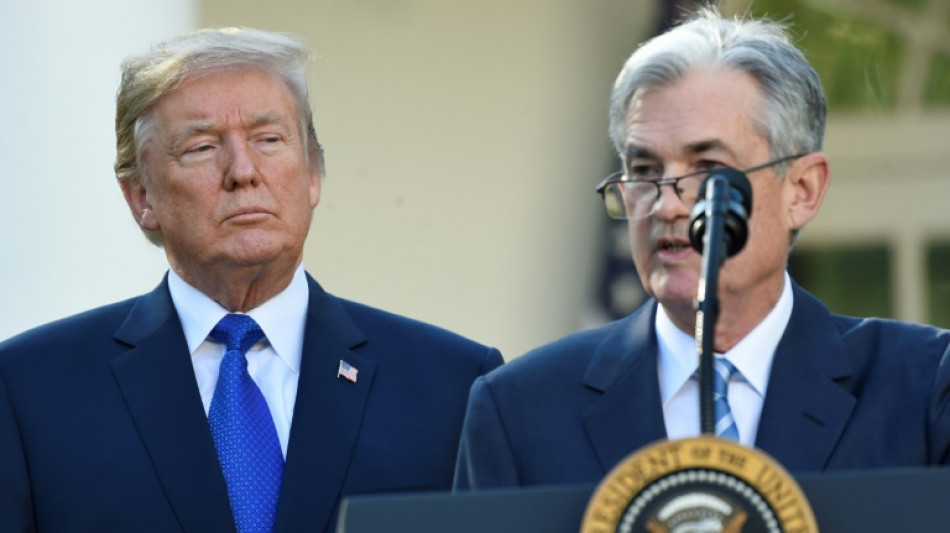
-
 US consumer confidence tumbles in December
US consumer confidence tumbles in December
-
Norwegian biathlete Sivert Guttorm Bakken found dead in hotel

-
 UK comedian Russell Brand faces two new rape, assault charges: police
UK comedian Russell Brand faces two new rape, assault charges: police
-
Venezuela seeks to jail backers of US oil blockade

-
 Norwegian biathlete Sivert Guttorm Bakken found dead
Norwegian biathlete Sivert Guttorm Bakken found dead
-
Wall Street stocks edge higher

-
 Vietnam Communist Party endorses To Lam to stay in top job
Vietnam Communist Party endorses To Lam to stay in top job
-
US economic growth surges in 3rd quarter, highest rate in two years

-
 Frank defends Van de Ven after Slot slams 'reckless' foul on Isak
Frank defends Van de Ven after Slot slams 'reckless' foul on Isak
-
Russian paramilitaries in CAR say take election threat 'extremely seriously'

-
 Trump in the Epstein files: five takeaways from latest release
Trump in the Epstein files: five takeaways from latest release
-
UK govt to relax farmers inheritance tax after protests

-
 Pakistani firm wins auction for state airline PIA
Pakistani firm wins auction for state airline PIA
-
Stocks slip on strong US growth data

-
 DR Congo beat Benin to kick off Cup of Nations bid
DR Congo beat Benin to kick off Cup of Nations bid
-
New Epstein files dump contains multiple Trump references

-
 Russian strike could collapse Chernobyl shelter: plant director
Russian strike could collapse Chernobyl shelter: plant director
-
Springbok captain Kolisi to rejoin Stormers

-
 Italy fines Ryanair $300 mn for abuse of dominant position
Italy fines Ryanair $300 mn for abuse of dominant position
-
Mahrez eyes strong AFCON showing from Algeria

-
 Killer in Croatia school attack gets maximum 50-year sentence
Killer in Croatia school attack gets maximum 50-year sentence
-
Thousands of new Epstein-linked documents released by US Justice Dept

-
 Stocks steady as rate cut hopes bring Christmas cheer
Stocks steady as rate cut hopes bring Christmas cheer
-
Bangladesh summons Indian envoy as protest erupts in New Delhi

-
 Liverpool's Isak faces two months out after 'reckless' tackle: Slot
Liverpool's Isak faces two months out after 'reckless' tackle: Slot
-
For director Josh Safdie, 'Marty Supreme' and Timothee Chalamet are one and the same

-
 Kyiv's wartime Christmas showcases city's 'split' reality
Kyiv's wartime Christmas showcases city's 'split' reality
-
Locals sound alarm as Bijagos Islands slowly swallowed by sea

-
 Cambodia asks Thailand to move border talks to Malaysia
Cambodia asks Thailand to move border talks to Malaysia
-
In Bulgaria, villagers fret about euro introduction

-
 Key to probe England's 'stag-do' drinking on Ashes beach break
Key to probe England's 'stag-do' drinking on Ashes beach break
-
Delayed US data expected to show solid growth in 3rd quarter

-
 Thunder bounce back to down Grizzlies, Nuggets sink Jazz
Thunder bounce back to down Grizzlies, Nuggets sink Jazz
-
Amazon says blocked 1,800 North Koreans from applying for jobs

-
 Trump says US needs Greenland 'for national security'
Trump says US needs Greenland 'for national security'
-
Purdy first 49er since Montana to throw five TDs as Colts beaten

-
 North Korea's Kim tours hot tubs, BBQ joints at lavish new mountain resort
North Korea's Kim tours hot tubs, BBQ joints at lavish new mountain resort
-
Asian markets rally again as rate cut hopes bring Christmas cheer

-
 Australian state poised to approve sweeping new gun laws, protest ban
Australian state poised to approve sweeping new gun laws, protest ban
-
Trapped under Israeli bombardment, Gazans fear the 'new border'

-
 Families want answers a year after South Korea's deadliest plane crash
Families want answers a year after South Korea's deadliest plane crash
-
Myanmar's long march of military rule

-
 Disputed Myanmar election wins China's vote of confidence
Disputed Myanmar election wins China's vote of confidence
-
Myanmar junta stages election after five years of civil war

-
 Ozempic Meals? Restaurants shrink portions to match bite-sized hunger
Ozempic Meals? Restaurants shrink portions to match bite-sized hunger
-
'Help me, I'm dying': inside Ecuador's TB-ridden gang-plagued prisons

-
 Australia's Cummins, Lyon out of fourth Ashes Test
Australia's Cummins, Lyon out of fourth Ashes Test
-
US singer Barry Manilow reveals lung cancer diagnosis

-
 'Call of Duty' co-creator Vince Zampella killed in car crash
'Call of Duty' co-creator Vince Zampella killed in car crash
-
Gold's Trust Model Is Being Rebuilt Around Infrastructure, SMX Is Writing the Blueprint

| RYCEF | 0.19% | 15.53 | $ | |
| RBGPF | 0% | 80.22 | $ | |
| SCS | 0.12% | 16.14 | $ | |
| CMSD | -0.35% | 23.12 | $ | |
| NGG | 1.04% | 77.21 | $ | |
| VOD | 1.15% | 13.03 | $ | |
| BCC | -1.16% | 73.38 | $ | |
| CMSC | 0.14% | 23.17 | $ | |
| RIO | 1.09% | 80.985 | $ | |
| JRI | 0.34% | 13.415 | $ | |
| RELX | -0.06% | 40.955 | $ | |
| BCE | -0.26% | 22.672 | $ | |
| GSK | 0.36% | 48.765 | $ | |
| BTI | 0.32% | 56.955 | $ | |
| AZN | 0.64% | 92.14 | $ | |
| BP | 0.96% | 34.47 | $ |

Trump victory poses challenges for the Fed's independence
Donald Trump's return to the White House could put the independence of the US Federal Reserve under strain, potentially weakening its ability to fight against inflation and unemployment free from political interference.
The Fed has a dual mandate from Congress to act independently to tackle both inflation and unemployment -- primarily by raising and lowering interest rates.
Anything that undermines the Fed's independence could spook traders in the financial markets, who might come to question if it could effectively tackle inflation.
"The prevailing view for the past 30 years, with the exception of the first Trump administration, has been that it's best to give the Fed the widest possible latitude to conduct monetary policy," David Wilcox, a senior fellow at the Peterson Institute for International Economics (PIIE), told AFP.
"Monetary policy is complicated enough even without having to take that additional consideration," added Wilcox, a former senior advisor to three Fed chairs who is also Bloomberg's director of US economic research.
- Trump's 'better instincts'? -
The Federal Reserve System includes a decentralized network of 12 regional reserve banks and a seven-member Board of Governors in Washington.
Fed governors are nominated by the US president to serve staggered 14-year terms, and must be confirmed by the Senate.
The Fed chair and vice chairs are appointed from among these seven governors and, once appointed, cannot be removed without cause.
The Fed Board of Governors also plays a role in approving nominations to run the 12 regional reserve banks.
However, those nominations are made by the regional reserve banks' own directors, adding a layer of protection against too much meddling from the center.
Where a future President Trump can -- and very likely will -- have a significant influence over the Fed is in his choice of nominations.
Jerome Powell is scheduled to step down as Fed Chair in May 2026, and Trump is not expected to renominate him.
The president-elect is a fierce critic of Powell -- whom he first nominated to run the US central bank -- accusing him without evidence of supporting the Democrats, and once even questioning if he was a bigger enemy than Chinese President Xi Jinping.
The president-elect has also said he has "better instincts" on the economy than many Fed governors, and argued that the US president should have "at least" a say setting interest rates.
But once Powell steps down as Fed Chair, he will remain a governor until 2028, should he choose to stay on, complicating Trump's nomination process.
To replace him with someone not currently on the board, Trump must either pressure an existing governor to quit, or replace Fed governor Adriana Kugler when her term expires in January 2026, and then nominate her replacement to the top job.
- 'Outsized influence' -
Given the "outsized influence" wielded by the US central bank chair, the next Trump-appointed Fed chief "could change the dynamic and the independence of monetary policy," Nationwide chief economist Kathy Bostjancic told AFP.
"If someone is nominated and appointed and are seen to have political leanings, and it allows them to influence their monetary policy decisions, then that would become quite messy for the Federal Reserve," she said.
But even with Trump's Republican Party back in control of the Senate, the next Fed Chair is still likely to receive plenty of scrutiny, Steve Englander, Standard Chartered's head of North America macro strategy, told AFP.
"It's not like you can pick a name out of a hat and drop him into the Senate, he gets confirmed the next day, and he's voted in the day after," he said.
Senators "take their role very seriously," he added.
A final backstop also exists in the bond markets, which take into account expectations of where the Fed's interest rates will be in the future, and which impact borrowing rates on everything from mortgages to car loans.
"You can't appoint someone 180 degrees out of the mainstream...because the bond market will reject that immediately," Englander said.
"The bond market is a guardrail," he added. "There's a limit."
L.Durand--AMWN